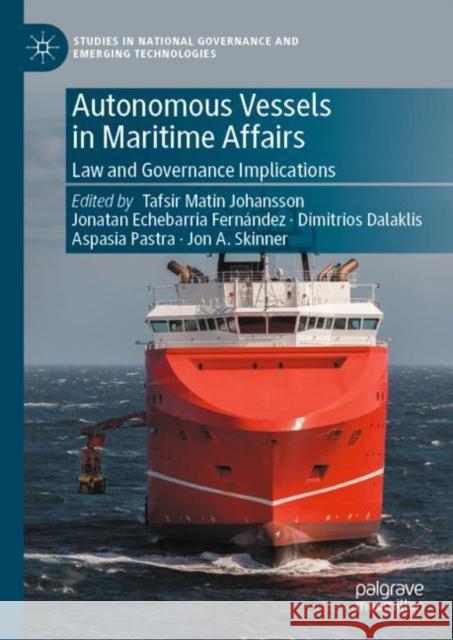Autonomous Vessels in Maritime Affairs: Law and Governance Implications » książka
Autonomous Vessels in Maritime Affairs: Law and Governance Implications
ISBN-13: 9783031247392 / Angielski / Twarda / 2023 / 278 str.
Autonomous Vessels in Maritime Affairs: Law and Governance Implications
ISBN-13: 9783031247392 / Angielski / Twarda / 2023 / 278 str.
(netto: 498,38 VAT: 5%)
Najniższa cena z 30 dni: 501,19
ok. 16-18 dni roboczych.
Darmowa dostawa!
This first-of-its-kind incisive and interdisciplinary volume spears through law and governance implications in relation to maritime autonomous surface ships (MASS). The book focuses on a wide array of timely, topical and thorny issues under eight distinct parts: setting the scene; naval warfare and security; safety, seaworthiness and techno-regulatory assessments; global environmental change; autonomous passenger transportation; liability and insurance; selected national and regional developments; and tying the threads. Thus, the main themes will stress on topics including evolution, environment, safety and security, society, insurance, liability, human element, design solutions and procedures, and selected national case studies. At the outset, the book commences with an insight into the role of innovation-diplomacy as the driving force that could expedite the transition from autonomation to autonomy, and a commentary from the Chair of IMO’s MASS. After navigating through the complex law and governance landscape, the book concludes with a chapter that captures the essence of the paradigm shift and ties all critical findings for further consideration.Chapter 11 and Chapter 18 are available open access under a Creative Commons Attribution 4.0 International License via link.springer.com.
This first-of-its-kind incisive and interdisciplinary volume spears through law and governance implications in relation to maritime autonomous surface ships (MASS). The book focuses on a wide array of timely, topical and thorny issues under eight distinct parts: setting the scene; naval warfare and security; safety, seaworthiness and techno-regulatory assessments; global environmental change; autonomous passenger transportation; liability and insurance; selected national and regional developments; and tying the threads. Thus, the main themes will stress on topics including evolution, environment, safety and security, society, insurance, liability, human element, design solutions and procedures, and selected national case studies. At the outset, the book commences with an insight into the role of innovation-diplomacy as the driving force that could expedite the transition from autonomation to autonomy, and a commentary from the Chair of IMO’s MASS. After navigating through the complex law and governance landscape, the book concludes with a chapter that captures the essence of the paradigm shift and ties all critical findings for further consideration.











